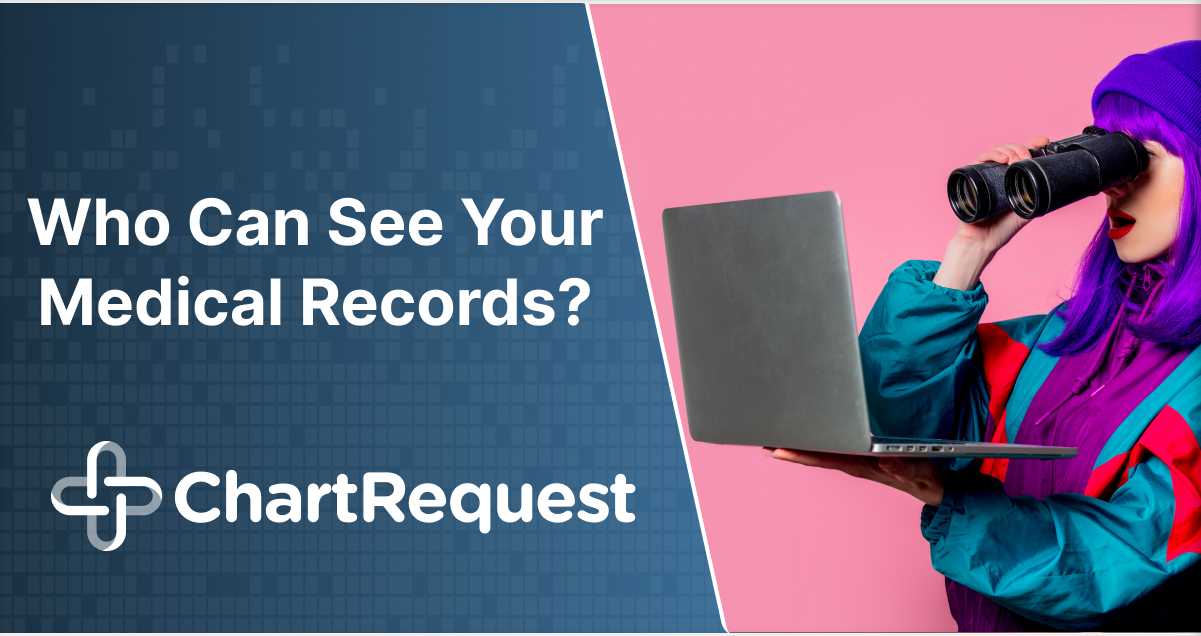You might do everything you can to keep your personal data secure. That is why knowing who can see your medical records may come as a shock.
Understanding the laws and regulations regarding your protected health information (PHI) is important if you want to protect it.
In this article, you will learn who has a right to access your medical chart and how to keep your records confidential. We’ll outline the rules about medical record keeping and offer practical tips to help you maintain control of your health data.
Partner with ChartRequest to secure ownership of your medical records today!
What Regulations Affect Access to Medical Records?
How much do you know about the laws and regulations protecting your medical records? According to the National Consumer Health Privacy Survey, two-thirds of Americans are only somewhat aware of federal mandates safeguarding their personal health records.
The Health Insurance Portability and Accountability Act (HIPAA) is the primary regulation governing access to your medical records. The HIPAA Privacy Rule sets national standards to safeguard individuals’ protected health information and its 18 identifiers. It also dictates who can view your medical records while outlining several patient rights.
Under the HIPAA Privacy Rule, you have critical rights that empower you to manage your PHI without obstruction:
- The right to access and obtain copies of your medical records: You can request and receive health records from healthcare providers. Restrictions may apply for certain types of records, such as mental health records.
- The right to request corrections: If any information in your medical record is inaccurate or incomplete, you can ask your healthcare providers to amend the records for accuracy.
- The right to know who uses your records: You can request an accounting of disclosures to detail who views your medical information and why.
Who Can See Your Medical Records Without Authorization?
With all of that regulatory information out of the way, let’s detail who can see your medical records.
While privacy is mandatory under HIPAA and other relevant regulations, there are specific situations where individuals can access your medical records without your explicit authorization.
Healthcare Providers and Authorized Staff
Healthcare providers involved in your care — such as doctors, nurses, and other authorized personnel — can access your medical records without your explicit authorization.
How can this be? If you have control of your PHI, how can physicians access and use them at their convenience?
Clinical access is vital for maintaining continuity of care. For instance, suppose your primary care physician refers you to a specialist. In this case, they can share your medical history without authorization.
The seamless exchange of information improves health outcomes and streamlines the coordination of care.
Insurance Companies
Insurance companies can review your medical records to process claims and verify treatments. This process typically occurs during claims submission, allowing insurers to assess and cover healthcare costs.
Legal Entities
A court may issue a subpoena for your medical records if they are relevant to a pending lawsuit or investigation. In special cases, government agencies can also access your PHI without your express permission. This standard may be controversial to some, but HIPAA protects these rights for public health and safety.
Who Can NOT See Your Medical Records Without Authorization?
Understanding who can see your medical records without permission is essential for maintaining your privacy. Still, there are many individuals who will never have a right to access this information beyond special exceptions or permissions.
Spouses, Family Members, and Caregivers
We get it — sometimes your family thinks they have your best interest at heart. That doesn’t mean they can go sifting through your private records unannounced.
Spouses, family members, and caregivers cannot access your medical records without your explicit permission. However, you may request medical records on behalf of your children if they are under 18 years old. This right guarantees that only trusted and authorized individuals can access your medical records.
Legal Representatives
Attorneys and other legal representatives must have explicit authorization to access your medical records. They may need this information for legal proceedings or to manage your healthcare decisions if you become incapacitated.
Generally, they need your written consent or a court order to access your health information for legitimate purposes.
Remember that a court can still issue a subpoena for this information in special cases. However, HIPAA limits subpoenas for certain types of records, such as mental health and substance abuse records.
Employers
Employers do not have the right to access your medical records without your permission.
You should limit any health-related information shared with your employer to the minimum necessary for accommodations or medical leave. This practice protects your privacy and ensures that your employer cannot misuse your medical data.
Control Your Medical Records With ChartRequest
Knowing who can see your medical records should give you some peace of mind.
HIPAA bestows you several rights to privacy, access, and PHI management, but it can be challenging to exercise these rights without the proper tools.
At ChartRequest, we understand the importance of personal privacy, which is why we provide a secure and efficient platform for managing medical record requests for people like you.
Our HIPAA-compliant system streamlines the process of requesting, accessing, and sharing medical records. This way, you can feel confident about your control over personal health data.


